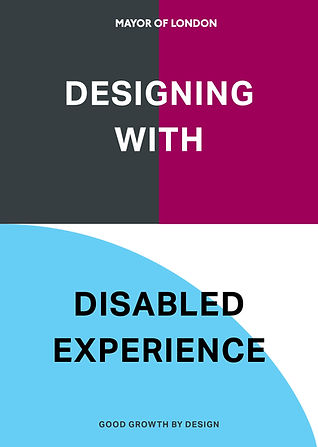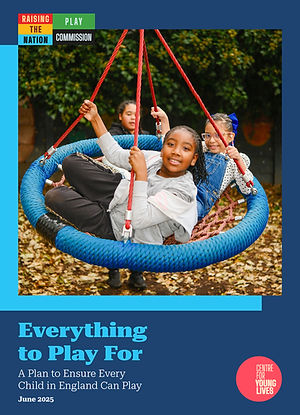
Research
*Hackney Council:
Contribution to research award
*Inspire Future Generations:
Research award
Published research is a key part of our work.
The 2025 book All to Play for: How to design child friendly housing, brings together ten years of research.




2025
All to Play For
How to design child-friendly housing
This book consolidates research from 2014 to 2024 at ZCD Architects including mapping, engagement and best practice. Drawing from the UK, Denmark, Sweden, Netherlands and Spain it explores what makes good housing design for children, providing insights and illustrated case study examples.
It explains our four child-friendly design principles, to aim for spaces that are: car-free, overlooked, directly accessible from a dwelling and connected to another space.
Other publications

2025
Select Committee Briefing on Children, Young People and the Built Environment published by the House of Commons
with evidence from experts including ZCD Architects and our director Dinah Bornat
This is a great resource of expert input that points us all towards the changes needed in policy and practice to make places better for children, young people and everyone. The briefing references Dinah’s book All to Play For: How to Design Child-Friendly Housing.
Dinah Bornat was invited to present oral evidence to the Committee, sharing key findings from ZCD’s projects and research.
Click here to watch an excerpt from her evidence session
2025
Designing with Disabled Experience
Features our Public Realm Inclusivity Panel (PRIP) at Earls Court as best practice in designing with disabled experiences at the forefront.
This report, part of the Mayor’s Good Growth by Design initiative sets out principles and practices that move beyond access, placing disabled experiences at the heart of creativity, care, interdependence, and spatial justice.
The PRIP is included as a best-practice case study, drawing on our three reports, which can be found here.


2025
Everything to Play for
Produced by the Centre for Young Lives as part of the Raising the Nation Play Commission. Dinah Bornat contributed by giving oral-evidence.
Launched in June 2024 and chaired by Paul Lindley OBE in partnership with Baroness Anne Longfield CBE and the Centre for Young Lives, the Raising the Nation Play Commission has brought together 19 expert commissioners to conduct an extensive year-long inquiry into why play is critical to children’s wellbeing, and how it can be restored to every childhood in England.
Dinah Bornat contributed by presenting oral evidence.
2024
Raising the Healthiest Generation in History: Why it Matters Where Children and Young People Live
Produced by the TCPA and Dinah Bornat as Contributing Author
Following the Levelling Up Housing and Communities Committee inquiry into Children, Young people and the Built Environment, examining how better planning, building and urban design in England could enhance the health and well-being of children and young people, the Town and Country Planning Association (TCPA) consolidated all of the evidence presented in a report called 'Raising the healthiest generation in history: why it matters where children and young people live'. It contains recommendations and an evidence review from the Select Committee Inquiry.
_Page_01.jpg)

2022
Chingford Mount Child Friendly District Research and Feasibility Study
Report on research findings from engagement programme at Chingford Mount.
This research is structured in two parts: Part 1 analyses data from young people's perspectives, while Part 2 presents collaboratively designed interventions. This approach provides local authorities with recommendations and a pilot scheme for future town centre projects. Based on youth input, the designs envision Chingford Mount as a centre that prioritises young people's needs.
2020
Making London Child-Friendly
Produced by Publica and Erect Architecture with a Foreword by Dinah Bornat who was co-chair of the MDA Sounding Board.
This report from the Mayor's Good Growth by Design initiative shows how smart urban design can help young Londoners move around independently. It combines research, policies, and practices to create guidelines for a child-friendly city. While there's been research on child-friendliness and mobility, it hasn't been well applied to urban design. This report fills that gap, showing how the built environment - including public spaces, roads, and housing - affects youth mobility.


2020
Making it possible to do Play Sufficiency
Produced by Play Wales. Dinah Bornat was a member of the review Panel.
This study expands on previous research about the Play Sufficiency Duty, examining how local authorities can support children's play opportunities. It looks at factors like people, policies, and funding that help implement Play Sufficiency. The report provides examples and recommendations for Welsh Government, Play Wales, local authorities, and children's workers.
2019
Neighbourhood Design
Report produced by ZCD Architects
This report addresses the lack of representation of children in urban development policies, focusing on a Hackney neighborhood through children's perspectives. We engaged, observed, and analyzed their outdoor activities, proposing innovative approaches to urban design and participation that better serve younger generations. Based on a commitment to become child-friendly, our study spans the De Beauvoir Estate and nearby De Beauvoir Primary School, offering insights applicable beyond Hackney to cities across the UK.


2019
Child-Friendly Planning in the UK
Written by Jenny Wood, Dinah Bornat and Aude Bicquelet-Lock.
This report examines how to include children's needs and rights in planning policy. It identifies gaps in current national policies despite ratified rights. The report focuses on key UNCRC rights such as participation, access to public spaces, and play. It suggests a 'child-friendly' approach and offers recommendations. The report highlights progress in Wales and Scotland, and potential in Northern Ireland. It calls for collaboration between nations to improve policies across the UK.
2018
Chain Reaction: Neighbourhood Play
Dinah Bornat wrote an essay for this anthology discussing the question: Do buildings damage your health?
Dinah's essay examines housing development design issues, focusing on integrating children's play spaces. It challenges policies that restrict play to designated areas and suggests creating neighbourhoods that encourage play throughout. The essay uses research to show the effects of reduced outdoor play and proposes urban spaces that promote health and community interaction.


2018
Between edges and hedges
Dinah Bornat wrote an essay for an anthology for Harrow Council on designing for children and people.
This essay examines the decrease in outdoor play for children and its effects on society, highlighting the importance of local neighborhood spaces. It suggests creating car-free, shared areas near homes for safe play and community interaction. Using photos, the essay outlines guidelines for developers and planners to design child-friendly environments. The goal is to transform neighbourhoods into sustainable spaces that benefit both children and residents.
2018
Cities Alive
ZCD's research gets referenced in this ARUP publication.
This report presents a child-focused approach to urban planning, highlighting its effects on children's growth and well-being. It looks beyond playgrounds to consider how the entire urban environment shapes children's futures and improves life for all residents. The report calls on city leaders to prioritize child-friendly urban design.


2018
Play Sufficiency and Neighbourhood Layout
Report produced by ZCD Architects
This report examines neighbourhoods in Wrexham County, Wales, focusing on factors that impact children's play opportunities. ZCD Architects' mapping method ranks neighbourhoods based on independent play levels. The study shows a link between mapping scores and children's satisfaction with play opportunities. This work supports Play Sufficiency planning in Wales and provides insights for the UK, linking social value to measurable outcomes through design.
2017
Making spaces for play
Produced by NHBC and ZCD Architects
This report examines how design and community spaces affect children's play and development. While global trends favor child-friendly urban planning, the UK is limiting outdoor play. The 2015 All-Party Parliamentary Group (APPG) report raised concerns and suggested ways to promote play. Our report backs these suggestions, using maps and observations to study how design impacts social space use.

